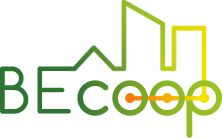Context analysis
BECoop will specifically equip administrative authorities with support schemes (replication guidelines, networking with more advanced regions, self-assessment tools, evidence from real practice) and skills (capacity building) so as to enable them to promote (as policy enablers, project facilitators and eneficiaries) such new forms of energy system governance and allow them to equally compete with other energy market actors.
On top of these, the project will ignite a policy debate at a local and EU level, through workshops and advocacy activities, aiming to streamline the BECoop policy recommendations to the actual support needs of policy makers. The BECoop process is deployed to 4 complementary cases of RESCoops and authorities across Europe (see pilot cases).
Tools and services development
BECoop develops then a set of tools and catalogues providing valuable knowledge and support to bioenergy communities actors (WP2): a self-assessment tool for enabling bioenergy communities to assess current status and future potential for market uptake in their region, a library of existing tools that can be applied to the provision of supporting services to bioenergy communities, catalogues listing technologies, business and organisational models, as well as financing schemes that will be available for the deployment of the supporting services.
Community building
Capacity building activities (WP3) ensure that training and consultancy/mentoring sessions is provided to key actors, mobilising stakeholders around bioenergy heating communities and empowering interactions amongst them. Awareness raising campaigns boost social acceptance for bioenergy community projects. Co-defining, along with key local stakeholders, a roadmap towards bioenergy heating for each developed community is a key goal of the next step (WP4): small-scale demonstration activities will test and illustrate the technical, business and financial feasibility of BECoop’s proposed solutions, insights and lessons-learned through our pilots will be shared. Communities will be empowered to address complex technical and non-technical aspects of their bioenergy initiatives, reduce their project development/management timings and efforts, and facilitate their market uptake.
Replication and policy
Finally, knowledge transfer, replication and policy activities (WP5) are organised to deliver a tool, the Knowledge Transfer Platform, where all produced information and supporting services of the project will be hosted, empowering knowledge exchange. A replication handbook for upscaling and replicating BECoop activities to other regional frameworks and a set of policy recommendations for improving the framework conditions towards a more effective market uptake of bioenergy communities for heating will be produced.
